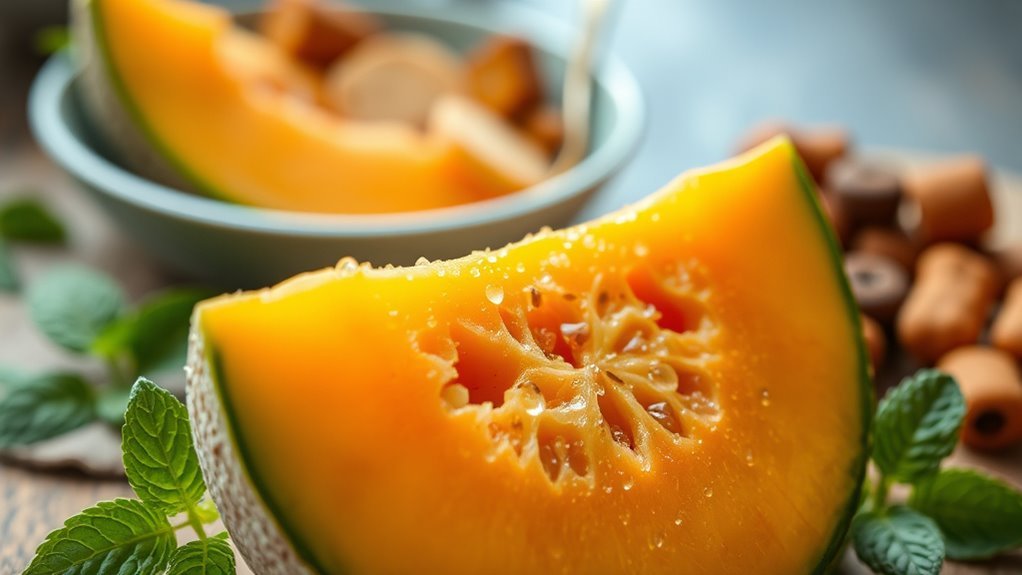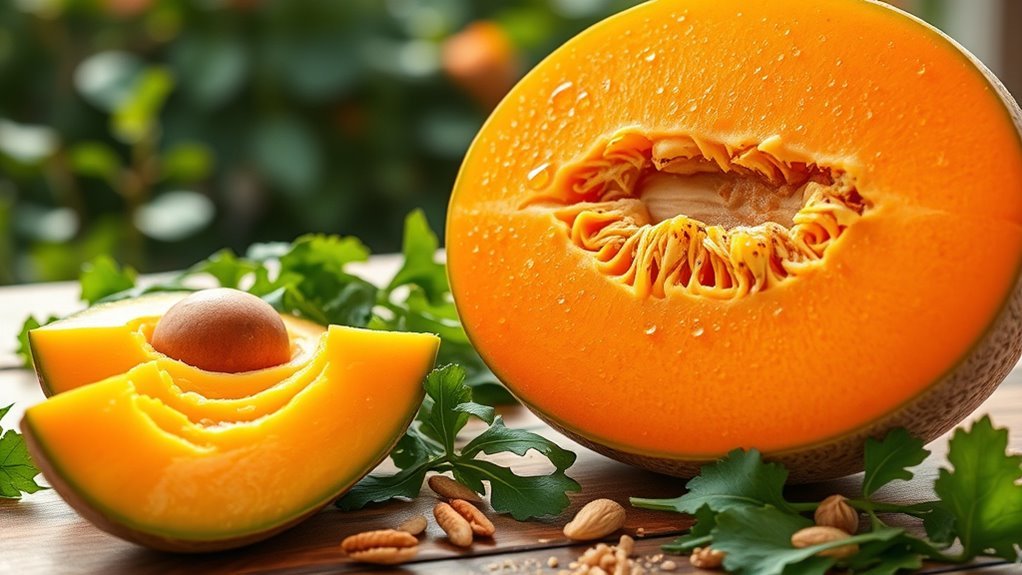Cantaloupe can be enjoyed on a keto diet, but you need to practice moderation. With about 8-13 grams of carbs per serving, it’s essential to keep track of your overall carb intake. While it’s lower in carbs than some fruits, its glycemic index of 65 means you should listen to your body. Pairing it with healthy fats can enhance its nutritional benefits. If you’re curious about creative ways to include cantaloupe in your meals, keep exploring!
Nutritional Profile of Cantaloupe

When it comes to evaluating whether cantaloupe fits into a keto diet, understanding its nutritional profile is crucial. Cantaloupe is rich in vitamins A and C, providing you with key nutrients that support immune function and skin health. Its vitamin content makes it a revitalizing addition to your meals. Plus, this fruit has impressive hydration benefits due to its high water content, which can help you stay hydrated throughout the day. Incorporating cantaloupe into your diet can offer a balance of taste and nutrition, allowing you to enjoy its sweetness while benefiting from essential vitamins. However, it’s important to take into account your overall carbohydrate intake to verify it aligns with your keto goals. Enjoy it in moderation for the best results!
Carbohydrate Content in Cantaloupe

Cantaloupe contains a moderate amount of carbohydrates, which is essential to take into account if you’re following a keto diet. A typical serving has about 8 grams of carbs, making it a less favorable option compared to other low-carb fruits. Here are some key points to keep in mind:
- Cantaloupe’s carb content can impact your daily intake.
- It’s important to track other carbohydrate sources in your diet.
- If you’re craving something sweet, explore keto alternatives like berries or avocados.
- Moderation is key; small servings may fit into your carb limit.
- Always listen to your body and adjust accordingly.
While cantaloupe can be enjoyed occasionally, staying mindful of its carbohydrate content will help you maintain your keto goals.
Comparing Cantaloupe to Other Fruits

When comparing cantaloupe to other fruits, it’s crucial to look at carbohydrate content, nutritional value, and the glycemic index. You’ll find that some fruits may have higher sugar levels, which could impact your keto diet more considerably. Understanding these differences can help you make informed choices about incorporating cantaloupe and other fruits into your meals.
Carb Content Comparison
Fruits are often celebrated for their natural sweetness and nutritional benefits, but they vary considerably in carbohydrate content. If you’re considering cantaloupe, you’ll want to compare it to other fruits to make the best choices for your diet.
Here’s a quick look at the carb content of some popular fruits:
- Cantaloupe (1 cup): ~13g carbs
- Strawberries (1 cup): ~11g carbs
- Blueberries (1 cup): ~21g carbs
- Watermelon (1 cup): ~11g carbs
- Raspberries (1 cup): ~15g carbs
When enjoying cantaloupe varieties, consider serving suggestions like pairing it with nuts or adding it to salads for a balanced meal. Knowing these carb counts can help you navigate your keto journey with freedom and confidence.
Nutritional Value Analysis
With about 13 grams of carbohydrates per cup, cantaloupe offers a rejuvenating option for those monitoring their carb intake. When you compare it to other fruits, cantaloupe varieties like the Galia or Honeydew may also provide similar carb counts, but they often lack the hydration and nutrient density found in cantaloupe. While berries, like strawberries, are lower in carbs, they don’t deliver the same invigorating taste and texture. For serving suggestions, consider pairing cantaloupe with a sprinkle of lime juice or even prosciutto for a delightful contrast. Overall, cantaloupe can fit into your diet while offering essential vitamins A and C, making it a balanced choice for those seeking a flavorful, low-carb fruit option.
Glycemic Index Overview
Understanding the glycemic index (GI) of cantaloupe can help you make informed choices about incorporating it into your keto-friendly diet. The glycemic impact of cantaloupe is relatively low compared to many other fruits, which means it won’t spike your blood sugar as much. Here’s how it stacks up against some common fruits:
- Cantaloupe: GI of 65
- Strawberries: GI of 41
- Blueberries: GI of 53
- Apples: GI of 38
- Bananas: GI of 51
How Cantaloupe Fits Into a Keto Diet
When considering cantaloupe on a keto diet, it’s crucial to analyze its carb content and how portion sizes can impact your carb intake. A typical serving of cantaloupe contains about 8 grams of carbs, which can add up quickly if you’re not mindful. Understanding how much you can enjoy while staying within your carb limits is key to incorporating this invigorating fruit into your keto meals.
Carb Content Analysis
Cantaloupe contains about 8 grams of carbohydrates per 100 grams, making it a fruit that requires careful evaluation for those following a keto diet. If you’re looking to enjoy cantaloupe while staying on track, here are some key points to reflect on:
- Opt for fresh cantaloupe to maximize flavor and nutrients.
- Proper cantaloupe storage can help retain its freshness and taste.
- Be mindful of portion sizes to manage carb intake effectively.
- Explore keto substitutions like berries or avocado for lower-carb options.
- Balance your diet with high-fiber, low-carb vegetables to stay in ketosis.
While cantaloupe can fit into a keto lifestyle, moderation is essential to maintain the freedom of choice without compromising your goals.
Portion Size Considerations
While enjoying cantaloupe can be tempting, it’s crucial to pay attention to portion sizes to keep your carb intake in check on a keto diet. A typical serving size is about one cup of cubed cantaloupe, which contains roughly 12 grams of carbs. To practice portion control, consider measuring your servings to avoid overindulging. You can pair cantaloupe with healthy fats, like cream or nuts, to create a balanced snack that satisfies your cravings without compromising your goals. Alternatively, use cantaloupe as a revitalizing addition to salads or smoothies, keeping your overall carb count in mind. By implementing these serving suggestions, you can enjoy the sweet taste of cantaloupe while maintaining your keto lifestyle effectively.
Creative Ways to Include Cantaloupe in Your Meals
Although you might think of cantaloupe as just a revitalizing summer snack, there are plenty of creative ways to incorporate it into your meals year-round. Cantaloupe’s versatility can elevate your dishes, adding flavor and a touch of sweetness. Here are some ideas:
- Blend it into invigorating cantaloupe smoothies for breakfast or a post-workout boost.
- Toss diced cantaloupe into green salads for a sweet contrast to savory ingredients.
- Use cantaloupe as a base for a revitalizing salsa, pairing it with lime and cilantro.
- Wrap thin slices of cantaloupe around prosciutto for a delicious appetizer.
- Freeze cantaloupe chunks for a cool addition to your beverages.
These creative uses not only enhance your meals but also keep your taste buds excited!
Potential Health Benefits of Cantaloupe on Keto
Incorporating cantaloupe into your meals can offer some surprising health benefits, even on a keto diet. This delicious fruit is low in carbs, making it a revitalizing option for your keto lifestyle. One of the key cantaloupe benefits is its high water content, which can help keep you hydrated while providing essential vitamins like A and C. These nutrients support immune function and skin health. Additionally, cantaloupe contains antioxidants that may protect your cells from damage. The fiber found in cantaloupe can aid digestion, promoting a feeling of fullness that may help with weight management. So, don’t hesitate to enjoy cantaloupe in moderation; it can be a tasty and nutritious addition to your keto meals!


